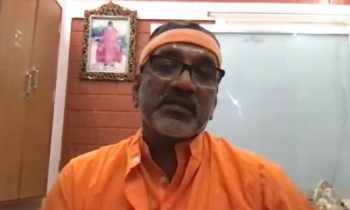On 12th May, 2022, Vivekananda International Foundation (VIF) organized the fourth session on ‘Gītā for the Millennia, an online talk series based on Śrīmad Bhagavad Gītā by Svāmī Mitrananda of Chinmaya Mission.
Svāmīji began the lecture with one of the most quoted verses from the Gītā, karmaṇy-evādhikāras te mā phaleṣu kadācana mā karma-phala-hetur bhūr mā te saṅgo ’stvakarmaṇi. It means that we have control and authority over our action (present) alone and not in the result (future). In other words, we can wish what we want on the action, not on the results as they are not in our hands. So let’s not bother on the results and don’t be attached to the results in order to give our best to our actions. Because only actions are in the present (certain), and results are in the future (uncertain).
Svāmīji provoked thoughts of the audience by asking haven’t we cheated ourselves many times thinking we would be happy if we become this or that, like I would be happy if I leave school, university, get a job, get married, etc. Isn’t it an ever remaining anticipation for living happily ever after? And when people get old they turn back to their childhood, the time, which they thought to be unhappy has now become the best time of their lives. In short, result oriented future looking thoughts are only utopian; because of them we fail to live in the present and perform our duties.
Svāmīji said that in order to be in the present, we have to pay reverence for how much we have already got. If we learn to celebrate how much we already have in our hand as blessings, then we will be able to find joy in the action (present), and not invest our anxiety in the result, which is in the future and the future is uncertain. At this point, Svāmī Chinmayananda’s words were recollected in the talk, where he says that the joy is in the race run and not in the trophy won. This joy alone helps us to bring a presence of mind in the present, which would have its positive effects on the future results.
Another verse that was discussed in the lecture was yoga-sthaḥ kuru karmāṇi saṅgaṁ tyaktvā dhanañjaya siddhy-asiddhyoḥ samo bhūtvā samatvaṁ yoga ucyate, which gives a beautiful definition of what Yoga is by saying samatvaṁ yoga ucyate, which means balance of mind, equanimity to success or failures, results is Yoga for which one has to practice detachment. Svāmīji also stressed what he was repeating in his previous lectures also that detachment does not hinder people from ‘having’, rather it is all about coming out of a mental illusion of ‘owning’. To convey how important the idea of detachment is, Svāmīji said that the concept of detachment is repeated around 84 times in the Gītā.
The third verse that was discussed in the lecture is the 50th verse of Chapter 2, buddhi-yukto jahātīha ubhe sukṛita-duṣkṛte tasmād yogāya yujyasva yogaḥ karmasu kauśalam. Svamiji highlighted the line yogaḥ karmasu kauśalam, which gives another definition for Yoga as dexterity in action. This means that when one has to perform an action, he/she will have to give their best to the action by being physically and mentally merged with the action. Also if we are not attached to the action and its results by dedicating the action to the Lord then we become not bound by the Karma of that action. Svamiji quoted an example from Rāmāyaṇa, where it is only in Ṛṣi Mukha Parvata that Bāli couldn’t chase Sugrīva. This indicates that it is in ‘Ṛṣi Mukha’ where we receive the Adhyātmic knowledge through satsang that we do not get chased by our Karma.
In simple terms the Gītā doesn’t tell us not to perform any action. As we live, we have to perform some or the other actions. Rather, the Gītā teaches the art of not getting bound by the Karma-phala of the actions that we are doing, which is called Karma Yoga. When we perform Karma Yoga, we don’t even need to crave to reach the Lord, rather the divine will come to us, just like how Lord Rāma hugged Hanumān, when he performed his duty to save the life of Lakṣamaṇa (Laye Sañjīvan Lakhan Jiyāye Śrī Raghuvīr Haraṣi ur laye, Hanumān Cālīsa). By mentioning this example, Svamiji highlighted the quality of Indian literature, which says that even God will descend when we perform our duties as Karma Yoga.
Swamiji advised the listeners to self-study the last 18 verses of the second chapter of the Gītā before they enter the third chapter of the text. Arjuna puts some important questions in these verses to which Kṛṣṇa answers; this mode of question and answer between a disciple and teacher make these verses like an Upaniṣad. Hence, though the lecture wouldn’t discuss all the 18 verses, they must be read and reflected before we go into the next chapter.
In the 54th verse of Chapter 2, which goes like arjuna uvāca sthita-prajñasya ka bhāṣa samadhi-sthasya keśava sthita-dhih kim prabhaṣeta kim asita vrajeta kim, Arjuna asks Kṛṣṇa about Sthitha Prakjña Lakṣaṇa. He is basically asking about how he would recognise if he came across an enlightened being. In other words, he is asking for the visible qualities of a Sthitha Prajña. To which, in brief, Kṛṣṇa answers that a person who is happy with himself or herself, without an outside source to trigger happiness. A Sthitha Prakjña is content with or without people and objects, and when such people act in the world, they are performing actions from happiness and not to get happiness. Such a person’s mind remains not affected by any misery, s/he neither craves for any pleasure and is free from attachment, fear and anger (duḥkheṣhv-anudvigna-manāḥ sukheṣhu vigata-spṛihaḥ vīta-rāga-bhaya-krodhaḥ sthita-dhīr munir uchyate). These are the qualities that we should gradually inculcate to be a person of steady wisdom or stitha prakjña. This is explained by an analogy, which comes as a verse in the Gītā itself, that just as the ocean remains undisturbed by the incessant flow of waters from rivers merging into it, likewise the sage, who is unmoved despite the flow of desirable objects all around him attains peace, and not the person who strives to satisfy desires.
Swamiji concluded the session by pointing out Śrī Rāma as an exemplar of Stitha Prakjña as he was balanced and self satisfied when he was given the kingdom and when he was sent to the forest.





Post new comment